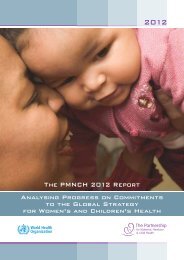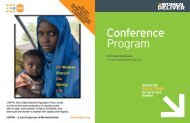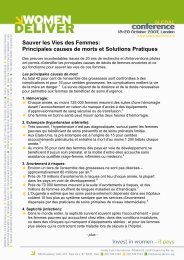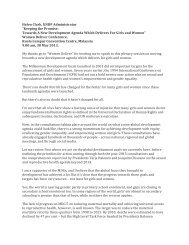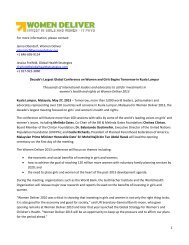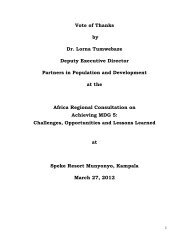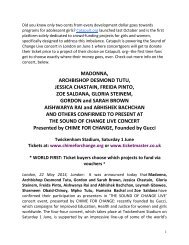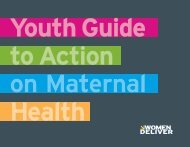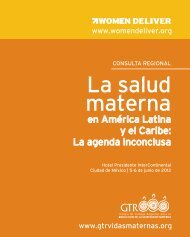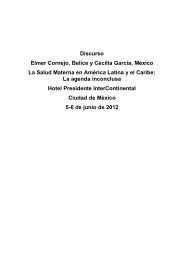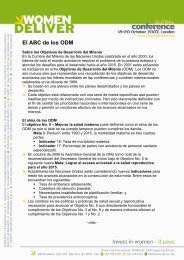State of World Population 2012 - UNFPA Haiti
State of World Population 2012 - UNFPA Haiti
State of World Population 2012 - UNFPA Haiti
Create successful ePaper yourself
Turn your PDF publications into a flip-book with our unique Google optimized e-Paper software.
tWomen who are able toplan their families aremore likely to be ableto send their children toschool. And the longerchildren stay in schoolthe higher their lifetimeearnings will be, helpingthem to lift themselvesout <strong>of</strong> poverty.©Lindsay Mgbor/UKDepartment for InternationalDevelopmentThe shift towards a rights-basedapproach to family planningThe value <strong>of</strong> a rights-based approach to familyplanning is that it treats individuals as fullhuman beings in their own right, as activeagents, not as passive beneficiaries. Thisapproach is built upon the explicit identification<strong>of</strong> rights-holders (individuals) and theduty-bearers (governments and others) that areresponsible for delivering on rights. Today, familyplanning is widely accepted as a foundationfor a range <strong>of</strong> rights.For this reason, a rights-based approachmay be the premise for the global sustainabledevelopment framework that will succeed theMillennium Development Goals, MDGs, whichwill conclude in 2015. In a recent essay aboutthe post-2015 agenda, the Office <strong>of</strong> the UnitedNations High Commissioner for Human Rightsstressed that the “increasing global embrace <strong>of</strong>human-rights-based approaches to development,based on the principles <strong>of</strong> participation,accountability, non-discrimination, empowermentand the rule <strong>of</strong> law, <strong>of</strong>fers hope that amore enlightened model <strong>of</strong> development isnow emerging.”Rights-based approaches—to family planningor other aspects <strong>of</strong> sustainable development—can lead to greater equity, equality and nondiscrimination.Children by choice, not by chanceThis <strong>State</strong> <strong>of</strong> <strong>World</strong> <strong>Population</strong> report explains whyfamily planning is a human right and what thatmeans for individuals in developing and developedcountries alike. The report synthesizes severalframeworks for health, reproductive health, andfamily planning, while also building upon themby: elevating the discussion about the importance<strong>of</strong> engaging men in family planning as partnersin relationships and in life, and as beneficiaries <strong>of</strong>services; underscoring the need to collect moredata and devise programming that also reachesunmarried young and older people alike; drawingattention to the high rates <strong>of</strong> unintended andunwanted pregnancies in both developing anddeveloped countries; and showing how changingsexual behaviour in different social contexts andacross age groups is increasingly at variance withold patterns about sexuality, which represent abarrier to making family planning available andaccessible to all.THE STATE OF WORLD POPULATION <strong>2012</strong>v




